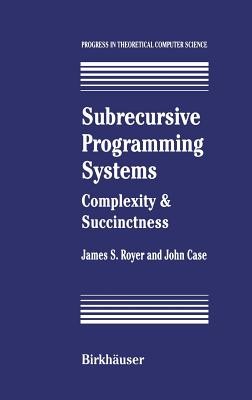
- We will send in 10–14 business days.
- Author: James S Royer
- Publisher: Birkhäuser
- ISBN-10: 0817637672
- ISBN-13: 9780817637675
- Format: 15.6 x 23.4 x 1.6 cm, hardcover
- Language: English
- SAVE -10% with code: EXTRA
Reviews
Description
1.1. What This Book is About This book is a study of - subrecursive programming systems, - efficiency/program-size trade-offs between such systems, and - how these systems can serve as tools in complexity theory. Section 1.1 states our basic themes, and Sections 1.2 and 1.3 give a general outline of the book. Our first task is to explain what subrecursive programming systems are and why they are of interest. 1.1.1. Subrecursive Programming Systems A subrecursive programming system is, roughly, a programming language for which the result of running any given program on any given input can be completely determined algorithmically. Typical examples are: 1. the Meyer-Ritchie LOOP language [MR67, DW83], a restricted assem- bly language with bounded loops as the only allowed deviation from straight-line programming; 2. multi-tape 'lUring Machines each explicitly clocked to halt within a time bound given by some polynomial in the length ofthe input (see [BH79, HB79]); 3. the set of seemingly unrestricted programs for which one can prove 1 termination on all inputs (see [Kre51, Kre58, Ros84]); and 4. finite state and pushdown automata from formal language theory (see [HU79]). lOr, more precisely, the collection of programs, p, ofsome particular general-purpose programming language (e.g., Lisp or Modula-2) for which there is a proof in some par- ticular formal system (e.g., Peano Arithmetic) that p halts on all inputs.
EXTRA 10 % discount with code: EXTRA
The promotion ends in 20d.15:32:41
The discount code is valid when purchasing from 10 €. Discounts do not stack.
- Author: James S Royer
- Publisher: Birkhäuser
- ISBN-10: 0817637672
- ISBN-13: 9780817637675
- Format: 15.6 x 23.4 x 1.6 cm, hardcover
- Language: English English
1.1. What This Book is About This book is a study of - subrecursive programming systems, - efficiency/program-size trade-offs between such systems, and - how these systems can serve as tools in complexity theory. Section 1.1 states our basic themes, and Sections 1.2 and 1.3 give a general outline of the book. Our first task is to explain what subrecursive programming systems are and why they are of interest. 1.1.1. Subrecursive Programming Systems A subrecursive programming system is, roughly, a programming language for which the result of running any given program on any given input can be completely determined algorithmically. Typical examples are: 1. the Meyer-Ritchie LOOP language [MR67, DW83], a restricted assem- bly language with bounded loops as the only allowed deviation from straight-line programming; 2. multi-tape 'lUring Machines each explicitly clocked to halt within a time bound given by some polynomial in the length ofthe input (see [BH79, HB79]); 3. the set of seemingly unrestricted programs for which one can prove 1 termination on all inputs (see [Kre51, Kre58, Ros84]); and 4. finite state and pushdown automata from formal language theory (see [HU79]). lOr, more precisely, the collection of programs, p, ofsome particular general-purpose programming language (e.g., Lisp or Modula-2) for which there is a proof in some par- ticular formal system (e.g., Peano Arithmetic) that p halts on all inputs.


Reviews